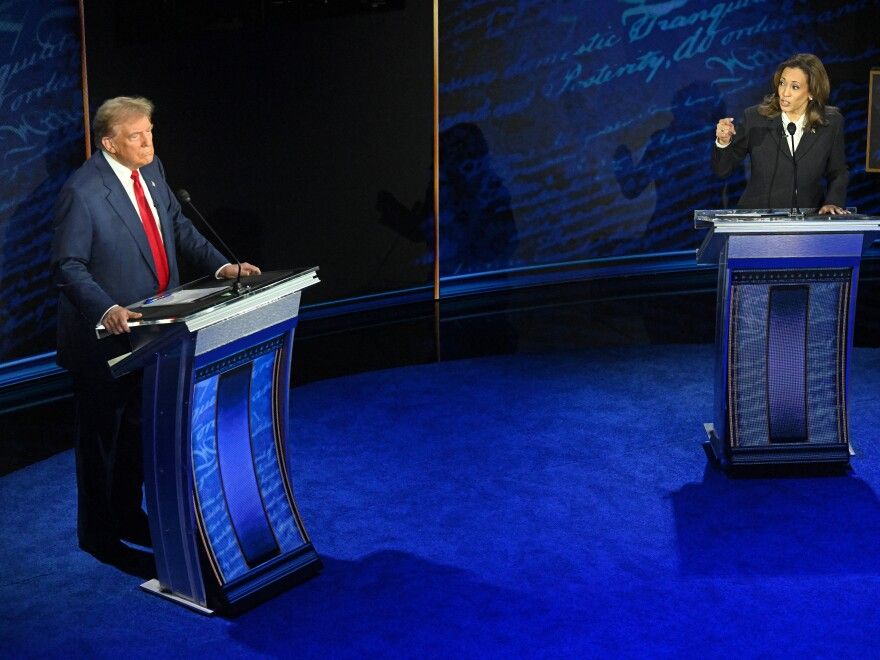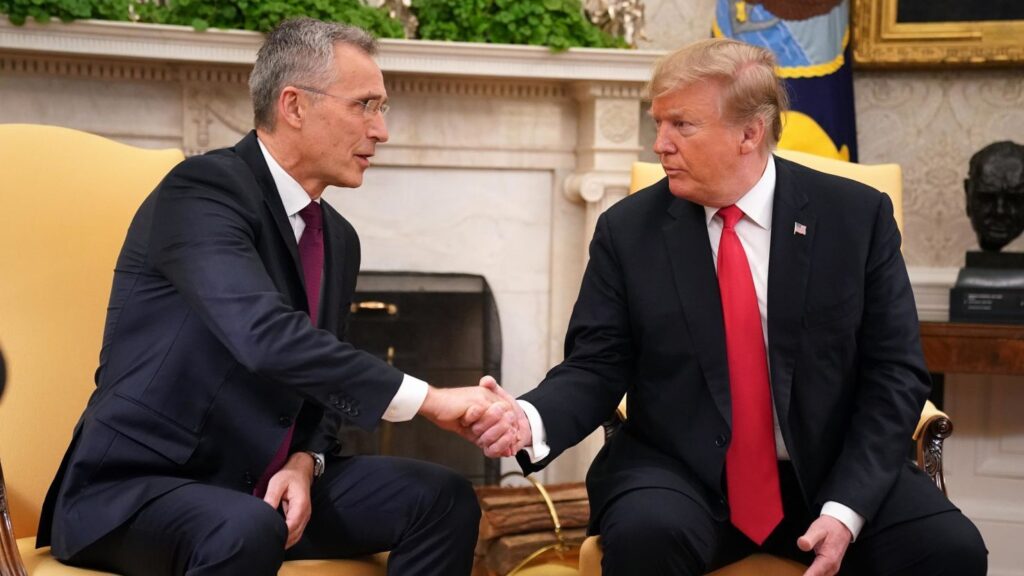In the recent debate between Donald Trump and Kamala Harris, the exchange of rhetoric was more than a mere contest of political acumen; it was a reflection of the broader ideological schisms that ripple across the Atlantic and influence the European Union’s political landscape. The debate, punctuated by Trump’s characteristic bluster and Harris’s poised retorts, reveals a dynamic that is both emblematic of the polarization in American politics and consequential for Europe’s political calculus.

Trump’s approach, marked by his trademark grandiosity and general disregard for nuanced argumentation, recalls the archetype of the populist leader who, with a blend of theatricality and raw appeal, seeks to reshape the political terrain. This populist flair, while primarily tailored to American domestic issues, resonates far beyond U.S. borders, offering a case study in the dynamic between charismatic authority and democratic fragility that European leaders closely observe.
On the other podium, Kamala Harris’s performance was a display of the modern liberal elite’s response to populist insurrection. Her responses, laden with policy substance and a more measured tone, stand in stark contrast to Trump’s more primal simplicity. This dichotomy underscores a broader conflict between the politics of intellectualism and the politics of spectacle—an issue that European political institutions must navigate as they face their own internal populist challenges. Harris’s insistence on nuanced policy discussion and legal detail is not merely a defensive maneuver; it represents a tacit commitment to the principles of governance and rational debate that European democratic institutions, steeped in millennia of philosophical and political tradition, hold dear.
However, while Trump may be seen by the European political class as a sort of “wild card,” or “loose cannon,” one could look to his four year presidential term and find various examples of agreement between him and the European establishment. A notable point of convergence between Trump’s administration and several European leaders was their shared emphasis on increasing NATO military spending. This alignment was particularly evident during Trump’s meeting with NATO Secretary-General Jens Stoltenberg at the 2018 NATO Summit, wherein Trump vociferously pressed Stoltenberg on the issue of equitable financial contributions. Trump’s contention that the United States was shouldering an unfair burden of NATO’s costs resonated with a number of European leaders who, despite their political differences, have acknowledged the need for greater defense spending within the alliance. This common ground highlights a pragmatic aspect of transatlantic relations where shared concerns over defense expenditures transcend ideological divides.

Fundamentally, what does this debate mean for the European Union? To grasp the implications, one must consider the underlying currents of ideological division and their potential impact on transatlantic relations. The EU, a construct borne out of the desire for stability and intellectual discourse, finds itself increasingly at odds with the rising tide of populism and nationalism that parallels Trump’s brand of politics. Brexit, as a vivid illustration of nationalist sentiment, underscores the challenges the EU faces in maintaining unity and coherence amidst growing demands for sovereignty and anti-establishment fervor. The EU’s commitment to multilateralism and nuanced negotiation is often at odds with the bombast and unilateralism epitomized by Trump.
European leaders are acutely aware of the threat posed by such populist figures. Trump’s approach to foreign policy—characterized by his “America First” doctrine and his disdain for multilateral agreements—is seen by many within the European establishment as a challenge to the EU’s strategic and economic interests. His threats to withdraw from NATO, skepticism toward climate agreements, and critical stance on trade deals reflect a broader threat to the political order that the EU champions. This debate’s outcome–and more cardinally the outcome of this presidential election–therefore, are not just a matter of American domestic politics but have profound implications for European stability and security.
Harris’s perspective, in contrast, represents a potential reassurance to European allies. Her approach toward NATO and the European political class seems, at this point in time, to be a continuation of the current Biden administration’s approach. Her emphasis on alliances, climate action, and multilateralism resonates with the EU’s own objectives.
The debate also underscores a deeper ideological divergence that affects European policy-making. The rise of populist movements within the EU, fueled by similar anti-establishment sentiments that bolster figures like Trump, creates a complex environment for European policymakers. They must navigate between their traditional commitments to the “core values” of the EU and the growing pressures from populist and nationalist factions that echo Trump’s rhetoric.
Furthermore, the debate’s impact on the EU extends to its internal dynamics. The EU’s institutions, already grappling with the challenges of maintaining unity amidst rising populism, may find new opportunities or pressures depending on the outcome. A victory for Trump could embolden anti-EU sentiment within member states, as populists within Europe attempt to “feed off” of a Trump victory. Having said that, a Trump victory may also have the potential to actually strengthen EU sentiment, as the European public may view European unity as increasingly necessary in a world of uncertainty surrounding a Trump presidency. Were Harris to win, her administration might offer a temporary reprieve and a chance to reinforce transatlantic ties and EU cohesion.
Ultimately, the recent Trump vs. Harris debate serves as a microcosm of the larger ideological battle that is shaping the global political landscape. For the European Union, the stakes are high. The outcome of this political contest will not merely determine the direction of U.S. domestic policy but will also reverberate across the Atlantic, influencing the EU’s strategic posture and its efforts to navigate an increasingly polarized global environment. As European leaders watch with bated breath, they must prepare for the ripple effects of this debate and its implications for the future of transatlantic relations and global governance.


